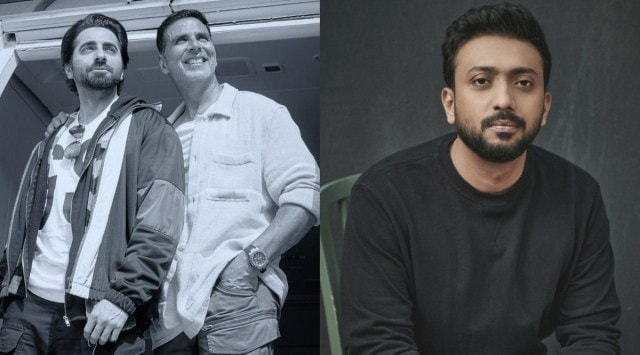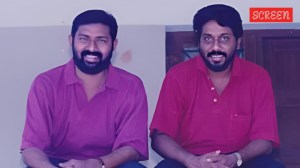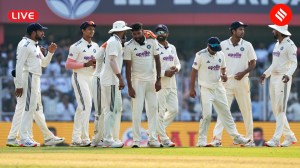Beyond the joy of having a celebrated debut film and the sadness of its inexplicable box office numbers, there is a state of being– director Anirudh Iyer can be found there. Anirudh, after years of assisting filmmaker Aanand L Rai, branched out to make his feature An Action Hero headlined by Ayushmann Khurrana and Jaideep Ahlawat.
The film, a deliciously outlandish action thriller, released on December 2 to widespread acclaim, but failed to show any action at the ticket window. The box office response has been puzzling for Anirudh, who doesn’t know where he went wrong. “People may not remember box office a while later, but the film will eventually live.”

In an interview with indianexpress.com, the director opens up about how he mounted the film, the scathing media commentary it displays against its reportage of the film industry, the hilarious Akshay Kumar cameo and what did Anand L Rai and Ayushmann Khurrana tell him after the film failed to take off.
Edited excerpts:
What did the reception make you feel like? The film opened to endless glowing reviews.
It is very special, overwhelming. I didn’t expect so much but on the other side, I didn’t expect such bad box office numbers also. It is a bit difficult to process this. I don’t know what to take from it. You have an experience, you make a film, then people point out to you certain things which didn’t work, and you see why that happened. You learn from that and go to the next one, that these are the things that I will or won’t do.
Here, my problem is that I am not able to find a closure. Everyone who has spoken to me have told me the film is perfect, that there is nothing that they would change in it. The numbers that the film has done, I am not able to understand, find that closure. That’s one mixed feeling I am in right now. How do I make myself better, what do I do to…. I don’t know what went wrong, but the reviews have been so wonderful. I am in a limbo; I am too happy but also upset.
Did you speak to Aanand L Rai or others around you, who have been in the business for longer and have seen these ups and downs?
Aanand sir said, ‘Beta usually what happens when a film does not work, I know what went wrong, what we should do better, do different. I didn’t know what to tell you right now, you did everything I asked for and in fact better. I have no answer, give me some time.’ Ayushmann said the same thing, ‘I don’t know what to tell you, we did everything right’. It is just a confusing time may be. But to take the positives from it, people may not remember box office a while later, but the film will live.
Story continues below this ad
Ayushmann’s Maanav was this flawed star, who was on a power trip as much as Jaideep’s Bhoora was. Can you tell me what was your approach to writing them?
People are grey, not black or white. We have all made good and bad choices. That was our default setting in writing. Both of them come from very different power trips. One was a superstar who was beyond his films, people, image–almost God like. On the other hand, you have a politician, who is also in that zone. For him–and people like him–superstars are nobody, they look at Bollywood like a filthy place. These are different personalities with the same power trip. They both believe that there is nobody beyond them.
It was fun to see these two. One represented the public; one represented the other class. It was interesting to bring both to a neutral place, that was UK, where nobody knows you– you are neither a politician, nor a star here. Now let’s see what happens. We took them out of their epicenter of power and placed them in this far away land to fight it out.
Was the film always set in Haryana, or it was a decision taken because you had Jaideep?
Story continues below this ad
We went to Jaideep because it was in Haryana. Neeraj (Yadav), my writer, is also from there. If you experience the land, the people there, their word and ego is beyond anything. It is beautiful in its own way. The land works like that, even the humour that comes out of Haryana, people say the funniest thing even in the most serious situations. They are not trying to be funny; this is just how they talk. We always thought we would go to a place which didn’t understand the film industry, a place that looks upon these people as nothing. That’s why we went so far in.
The media commentary in the film is scathing. Did you take notes in the lockdown over its coverage about the film industry?
If you are telling a doctor story, you have to talk about the patients, their family, the doctor’s family, the hospital staff. There are so many layers that come along to make that character stronger. Similarly, when you talk about a film star’s life, it is a very important part of their lives– the media, the public, the film industry and their colleagues. If you are afraid to talk about even one of the aspects, then you should probably not tell the story. It won’t be complete. You cannot ignore that aspect. We also had the pressure to not make the media as a big character in the film, so we tried to bring them in song montages, so that they feel like an element of society and not characters.
The film also shows the entitlement of Bhoora and the media, that they own the star, or their narrative and life.
Story continues below this ad
People forget that even the stars are human beings, they will say things they shouldn’t say, do things they shouldn’t do. It is only because they are in the public eye… There is a line in the film, which I really love, ‘Chhota aadmi kare toh galti, bada aadmi kare toh misaal (If a common does it, it’s a mistake, if a known man does it, it’s a lesson)’. It is an unfair thing. That kind of responsibility is difficult. But Bhoora also has a point of view: that you are a star because we have made you, it because of our love that you are where you are so do as we say. That’s one way to look at it.
How did the cameos of Akshay Kumar and Malaika Arora come about? Akshay’s part is hilarious, especially when he tells Manav ‘Don’t tell anyone we met’.
The reason why we wanted that scene between Akshay and Ayushmann is because we wanted to see what happens when a superstar is in trouble and he meets a fellow superstar, his colleague. When Akshay sir read that scene, he laughed so loud, he was such a sport. We had a backup scene, we thought he may not want to do this, but he said no we have to do it this way. He has a great sense of humour; any other actor perhaps would not have done this.
With Malaika, coincidently it happened that Aap Jaisa Koi is her favourite song! I wanted her for the film because she is the original diva. Thankfully she was also a sport and agreed to come on board.




































